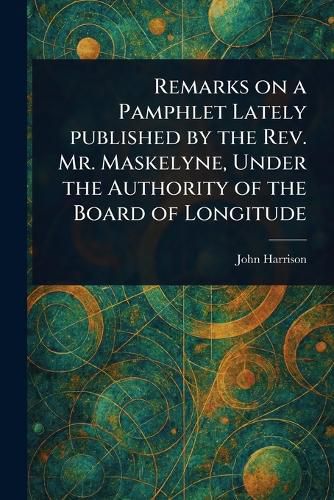Readings Newsletter
Become a Readings Member to make your shopping experience even easier.
Sign in or sign up for free!
You’re not far away from qualifying for FREE standard shipping within Australia
You’ve qualified for FREE standard shipping within Australia
The cart is loading…






This title is printed to order. This book may have been self-published. If so, we cannot guarantee the quality of the content. In the main most books will have gone through the editing process however some may not. We therefore suggest that you be aware of this before ordering this book. If in doubt check either the author or publisher’s details as we are unable to accept any returns unless they are faulty. Please contact us if you have any questions.
A fascinating glimpse into the history of navigation and horology, "Remarks on a Pamphlet Lately published by the Rev. Mr. Maskelyne, Under the Authority of the Board of Longitude" offers a unique perspective on the quest to solve the longitude problem. This meticulously prepared print edition presents John Harrison's response to criticism levied against him and his groundbreaking chronometer. Delve into the intricate world of 18th-century science and engineering as Harrison defends his invention against the authority of the Board of Longitude and the Rev. Mr. Maskelyne.
Explore the technical writing that defined an era, revealing the challenges and triumphs involved in creating accurate timekeeping for maritime navigation. Discover the historical context of astronomy, physics, and technology as they converged in the pursuit of determining longitude. This volume provides invaluable insight into the scientific debates surrounding Harrison's chronometer and its impact on the age of exploration. A significant historical document for anyone interested in the development of precision instruments and the history of science.
This work has been selected by scholars as being culturally important, and is part of the knowledge base of civilization as we know it.
This work is in the public domain in the United States of America, and possibly other nations. Within the United States, you may freely copy and distribute this work, as no entity (individual or corporate) has a copyright on the body of the work.
Scholars believe, and we concur, that this work is important enough to be preserved, reproduced, and made generally available to the public. We appreciate your support of the preservation process, and thank you for being an important part of keeping this knowledge alive and relevant.
$9.00 standard shipping within Australia
FREE standard shipping within Australia for orders over $100.00
Express & International shipping calculated at checkout
This title is printed to order. This book may have been self-published. If so, we cannot guarantee the quality of the content. In the main most books will have gone through the editing process however some may not. We therefore suggest that you be aware of this before ordering this book. If in doubt check either the author or publisher’s details as we are unable to accept any returns unless they are faulty. Please contact us if you have any questions.
A fascinating glimpse into the history of navigation and horology, "Remarks on a Pamphlet Lately published by the Rev. Mr. Maskelyne, Under the Authority of the Board of Longitude" offers a unique perspective on the quest to solve the longitude problem. This meticulously prepared print edition presents John Harrison's response to criticism levied against him and his groundbreaking chronometer. Delve into the intricate world of 18th-century science and engineering as Harrison defends his invention against the authority of the Board of Longitude and the Rev. Mr. Maskelyne.
Explore the technical writing that defined an era, revealing the challenges and triumphs involved in creating accurate timekeeping for maritime navigation. Discover the historical context of astronomy, physics, and technology as they converged in the pursuit of determining longitude. This volume provides invaluable insight into the scientific debates surrounding Harrison's chronometer and its impact on the age of exploration. A significant historical document for anyone interested in the development of precision instruments and the history of science.
This work has been selected by scholars as being culturally important, and is part of the knowledge base of civilization as we know it.
This work is in the public domain in the United States of America, and possibly other nations. Within the United States, you may freely copy and distribute this work, as no entity (individual or corporate) has a copyright on the body of the work.
Scholars believe, and we concur, that this work is important enough to be preserved, reproduced, and made generally available to the public. We appreciate your support of the preservation process, and thank you for being an important part of keeping this knowledge alive and relevant.